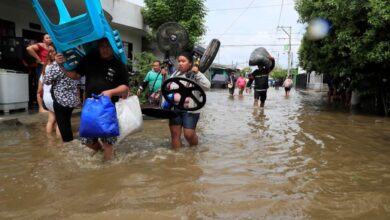The kidnapping of Luis Díaz's father by the ELN guerrilla group in Colombia spotlights the critical need for expedited peace and security measures

Photo: Photo provided by the UN today showing Luis Manuel Diaz (c), father of Liverpool soccer player Luis Diaz, released after 12 days kidnapped by National Liberation Army (ELN) guerrillas. EFE/UN
Latin American Post Staff
Escucha este artículo
Leer en español: Paz urgente: la epidemia de secuestros en Colombia requiere acción inmediata
Kidnappings in Colombia: A Call for Urgent Action
The recent ordeal of Luis Manuel Díaz, father of Liverpool's star striker Luis Díaz, at the hands of the National Liberation Army (ELN) guerrillas painfully illustrates the chronic insecurity plaguing Colombia. The twelve-day abduction, ending with his release, has brought international attention to the long-standing issue of kidnappings in Colombia, a nation weary of violence and longing for peace.
Colombia's struggle with guerrilla warfare and the accompanying abductions is not new. For decades, families across the country have been plunged into despair by the actions of armed groups like the ELN. The kidnapping of the elder Díaz, however, hit a nerve on the global stage, partly due to the prominence of his son, who turned his sporting achievement into a platform to plea for his father's freedom. This high-profile case has become a conduit for a broader discussion on the necessity of expedited and effective peace negotiations.
The ELN's claim that the kidnapping was a mistake and their subsequent release of Díaz should not distract from the core issues at hand. For too long, Colombians have navigated the treacherous waters of uncertainty and fear, facing the prospects of violence and kidnappings as part of daily life. The government's peace talks with the ELN have been a protracted process, with incremental progress that seems increasingly out of step with the urgency of the current climate.
Beyond the Emotional Return
While heartening, the emotional return of Luis Manuel Díaz to his hometown, his tearful thanks to his community, and the collective sigh of relief from Barrancas and beyond are not enough to close the chapter on this traumatic episode. The question lingers: How many more families must endure what the Díaz family has gone through? For a nation running low on patience, the answer must be none.
Colombia's Ombudsman's Office estimates that between January 2022 and September 2023, armed groups were responsible for 160 kidnappings. Each of these instances is a stark violation of human rights and a direct challenge to the state's sovereignty. Post-release, the government's demand that the ELN free any remaining hostages is a step in the right direction, but it cannot be the last step. The pace of peace must quicken because the Colombian people can no longer be bystanders to violence.
A Holistic Approach
The government must leverage the current negotiations to push for an immediate cessation of kidnappings. Yet, a broader, more holistic approach is needed—one that addresses the socioeconomic disparities that feed into the cycle of violence. Strengthening security in rural areas, where armed groups find it easier to operate, and improving the socioeconomic conditions that allow these groups to recruit and thrive are critical components of a sustainable solution.
To this end, the Colombian government, with the support of international allies, must not only continue but intensify its efforts to dismantle the operational capabilities of groups like the ELN. A multi-faceted strategy combining military action with social and economic reforms can provide all Colombians with a more stable and secure environment.
Furthermore, it's vital to consider the psychological impact of kidnappings on the national psyche. The fear of abduction hampers freedom, stifles economic activity, and erodes trust in the government's ability to protect its citizens. This psychological toll calls for a robust support system for victims and their families and community-based initiatives that foster resilience and collective action against threats.
Also read: Elections in Colombia 2023: the Disorder of Petrism vs the Inexperience of Duquism
A Call for Concrete Actions
The case of Luis Manuel Díaz is a poignant illustration of the broader narrative of a nation's fight for peace. His son's poignant plea and the community's collective action for his release exemplify the enduring spirit of the Colombian people. It's a spirit that deserves to be met with concrete actions and policies that ensure no family has to endure such an ordeal again.
While the Colombian people have shown remarkable patience and resilience in the face of adversity, their endurance should not be tested by a slow-moving peace process. The time has come for the Colombian government and international mediators to act with renewed vigor and resolve. The Díaz family's nightmare might end, but the nation's ordeal continues. Swift, decisive actions to secure peace and safety are not just desired; they are demanded by the Colombian people, whose patience is not just running low—it's nearing its end.





